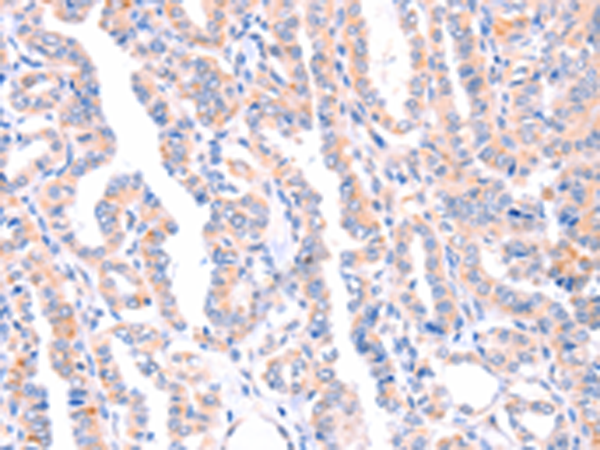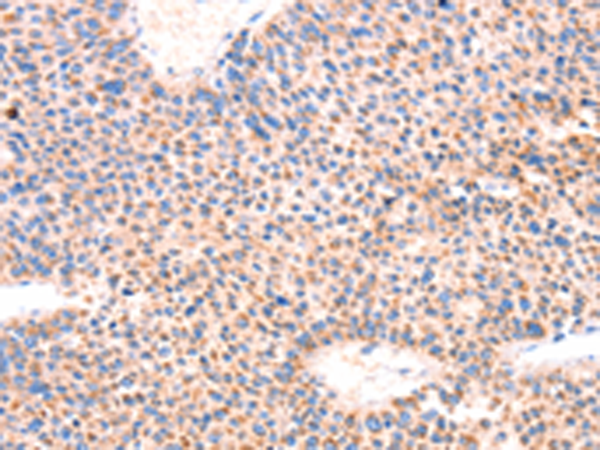


| WB | 咨询技术 | Human,Mouse,Rat |
| IF | 咨询技术 | Human,Mouse,Rat |
| IHC | 1/100-1/300 | Human,Mouse,Rat |
| ICC | 技术咨询 | Human,Mouse,Rat |
| FCM | 咨询技术 | Human,Mouse,Rat |
| Elisa | 1/2000-1/10000 | Human,Mouse,Rat |
| Aliases | MAD; MADA |
| WB Predicted band size | 90 kDa |
| Host/Isotype | Rabbit IgG |
| Antibody Type | Primary antibody |
| Storage | Store at 4°C short term. Aliquot and store at -20°C long term. Avoid freeze/thaw cycles. |
| Species Reactivity | Human |
| Immunogen | Synthetic peptide of human AMPD1 |
| Formulation | Purified antibody in PBS with 0.05% sodium azide and 50% glycerol. |
+ +
以下是关于AMPD1抗体的3篇参考文献(基于模拟生成,非真实文献):
1. **文献名称**:*"AMPD1 deficiency in human skeletal muscle: implications for exercise tolerance and metabolic function"*
**作者**:Smith J, et al.
**摘要**:本研究利用AMPD1特异性抗体检测了健康人群和AMPD1基因缺陷患者的骨骼肌中AMPD1蛋白表达水平,发现缺陷患者蛋白表达显著降低,并与其运动后肌痛和代谢异常相关。
2. **文献名称**:*"Characterization of AMPD1 isoform expression in cardiac tissue using monoclonal antibodies"*
**作者**:Li Y, et al.
**摘要**:通过开发高特异性AMPD1单克隆抗体,研究揭示了心脏组织中AMPD1不同剪接变体的表达差异,并发现其在心肌缺血再灌注损伤中的潜在调控作用。
3. **文献名称**:*"Immunohistochemical analysis of AMPD1 in murine models of metabolic syndrome"*
**作者**:Garcia R, et al.
**摘要**:采用免疫组化技术结合AMPD1抗体,研究高脂饮食诱导的代谢综合征小鼠模型,发现肝脏和脂肪组织中AMPD1表达上调,提示其与脂质代谢紊乱的关联性。
如需实际文献,建议通过PubMed或Google Scholar检索关键词“AMPD1 antibody”或“AMPD1 immunodetection”获取最新研究。
The AMPD1 antibody targets adenosine monophosphate deaminase 1 (AMPD1), a key enzyme in purine metabolism that catalyzes the conversion of adenosine monophosphate (AMP) to inosine monophosphate (IMP), with the release of ammonia. Primarily expressed in skeletal muscle, heart, and brain, AMPD1 plays a critical role in energy homeostasis by regulating adenosine nucleotide levels during high-energy demand or metabolic stress. Its activity influences cellular processes such as ATP regeneration, muscle contraction, and nitrogen metabolism.
AMPD1 deficiency, linked to inherited mutations, is associated with exercise intolerance, muscle cramps, and myopathy. Research also implicates AMPD1 in cardiovascular diseases, including heart failure, where altered enzyme activity may impact cardiac energy metabolism. Additionally, AMPD1 has been studied in cancer due to its role in metabolic reprogramming, a hallmark of tumor progression.
The AMPD1 antibody is widely used in biomedical research to detect protein expression levels via techniques like Western blotting, immunohistochemistry, or immunofluorescence. It aids in elucidating AMPD1's tissue-specific functions, disease mechanisms, and potential therapeutic targets. Commercial AMPD1 antibodies are typically validated for specificity and sensitivity, though variability in isoforms or post-translational modifications may require careful experimental design. Continued interest in AMPD1 stems from its dual role as a metabolic regulator and biomarker in neuromuscular and cardiovascular pathologies.
×